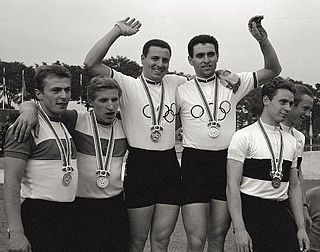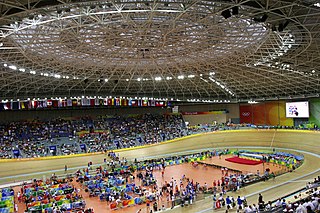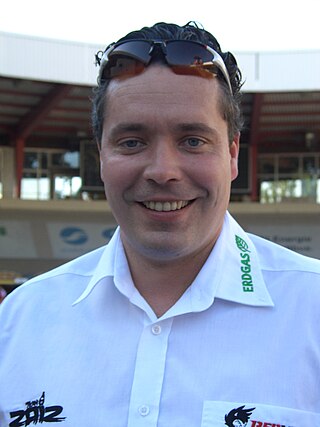
The men's sprint at the 2004 Summer Olympics (Cycling) was an event that consisted of cyclists making three laps around the track. Only the time for the last 200 metres of the 750 metres covered was counted as official time. There were 19 competitors from 13 nations, with each nation limited to two cyclists. The event was won by Ryan Bayley of Australia, the nation's first victory in the men's sprint after three times coming in second. Theo Bos of the Netherlands took silver, the Dutch team's first medal in the event since 1936. René Wolff earned bronze, stretching Germany's podium streak to four Games.

The men's sprint was a track cycling event held as part of the Cycling at the 1964 Summer Olympics programme. It was held on 17 and 18 October 1964 at the Hachioji Velodrome. 39 cyclists from 22 nations competed. Nations were limited to two cyclists each. The event was won by Giovanni Pettenella of Italy, the nation's second consecutive and fourth overall victory in the men's sprint. Sergio Bianchetto took silver, making it the second consecutive Games in which Italy had two men on the podium in the event. It was also the fifth straight Games with Italy taking at least silver. Daniel Morelon of France took bronze, the first of his record four medals in the event.

The men's tandem was a track cycling event held as part of the Cycling at the 1964 Summer Olympics programme. It was held on 21 October 1964 at the Hachioji Velodrome. 13 pairs competed.
The men's team pursuit was a track cycling event held as part of the Cycling at the 1964 Summer Olympics programme. The course was 4000 metres. It was held on 19 October and 21 October 1964 at the Hachioji Velodrome. 18 teams of 4 cyclists each competed.

The men's sprint at the 2008 Summer Olympics took place on August 17–19 at the Laoshan Velodrome. There were 21 competitors from 15 nations, with each nation limited to two cyclists. The event was won by Chris Hoy of Great Britain, the nation's first victory in the men's sprint and first medal in the event since 1948. He faced his teammate Jason Kenny in the final, the first time since 1984 that one nation had taken the top two spots. Mickaël Bourgain of France earned bronze. Germany's four-Games podium streak ended.

The men's 400 metres hurdles event was part of the track and field athletics programme at the 1924 Summer Olympics. The competition was held on Sunday, July 6, 1924, and on Monday, July 7, 1924. Twenty-three hurdlers from 13 nations competed. The maximum number of athletes per nation was 4. The event was won by Morgan Taylor of the United States, the fifth consecutive victory by an American in the event. Erik Wilén received silver, Finland's first medal in the men's 400 metres hurdles. Another American, Ivan Riley, took bronze.

The men's 200 metres event was part of the track and field athletics programme at the 1924 Summer Olympics. The first two rounds were held on 8 July, with the semifinals and final on 9 July. Sixty-five sprinters from 33 countries competed. Nations were limited to 4 athletes each. The event was won by Jackson Scholz of the United States, the nation's third consecutive victory in the event and fifth in six Games. For the third straight Games, the podium consisted of two Americans winning gold and silver and a Brit taking bronze. Paddock, the silver medalist in 1920 as well, was the second man to earn multiple medals in the 200 metres.
The men's 400 metres event was part of the track and field athletics programme at the 1924 Summer Olympics. This race was depicted in the film Chariots of Fire. The competition was held on Thursday, July 10, 1924, and on Friday, July 11, 1924.

The men's sprint event was part of the track cycling programme at the 1924 Summer Olympics. The field consisted of 31 cyclists from 17 countries. The Vélodrome de Vincennes track was a 500-metre (1,640 ft) loop. The event was won by Lucien Michard of France, the nation's third victory in the men's sprint. His teammate Jean Cugnot earned bronze. Jacob Meijer of the Netherlands took silver, putting the Dutch team on the podium for the second consecutive Games.

The men's 200 metres was held on 2 September and 3 September as part of the athletics at the 1960 Summer Olympics, which were held in Rome. 74 athletes from 54 nations entered, but only 62 athletes from 47 nations ultimately competed. The maximum number of athletes per nation had been set at 3 since the 1930 Olympic Congress. The event was won by Livio Berruti of Italy, the first victory in the event by a nation outside of North America and snapping a five-Games winning streak by the United States. The Americans finished with a silver medal, by Lester Carney, to extend their medal streak to six Games. Abdoulaye Seye of France took bronze. Berruti's gold and Seye's bronze were the first medal for their nations in the men's 200 metres.

The men's sprint cycling event at the 1932 Summer Olympics took place on August 1 and 3. The format was a sprint of 1000 metres. There were nine competitors from nine nations, with each nation limited to one cyclist. The event was won by Jacobus van Egmond of the Netherlands, the nation's second victory in the men's sprint. It was the fourth consecutive Games that the Netherlands reached the podium in the event. France made the podium for the third consecutive Games, with Louis Chaillot taking silver. Bruno Pellizzari gave Italy its first men's sprint medal with his bronze.

The men's sprint at the 1992 Summer Olympics (Cycling) was an event that consisted of cyclists making three laps around the track. Only the time for the last 200 metres of the 750 metres covered was counted as official time. The races were held on Tuesday, July 28, Wednesday, July 29, Thursday, July 30 and Friday, July 31, 1992, at the Velòdrom d'Horta. There were 23 competitors from 23 nations, with each nation limited to one cyclist. The event was won by Jens Fiedler of Germany, the first victory in the men's sprint for Germany as a unified nation since 1936. Gary Neiwand of Australia took silver, the third time that nation had a runner-up in the event; Neiwand was only the fourth man to win multiple medals in the sprint. Canada earned its first medal in the men's sprint with Curt Harnett's bronze.

The men's coxed four event was part of the rowing programme at the 1928 Summer Olympics. It was one of seven rowing events for men and was the fifth appearance of the event. It was held from 3 to 10 August. There were 11 boats from 11 nations, with each nation limited to a single boat in the event. The event was won by Italy, the nation's first medal in the men's coxed four. The Italian team dethroned two-time reigning champion Switzerland, beating the Swiss crew in both the semifinals and the final. Switzerland's silver medal brought its podium streak in the event to three Games; the United States had its two-Games medal streak end. Poland took bronze, its first medal in the event.

The men's sprint at the 1996 Summer Olympics (Cycling) was an event that consisted of cyclists making three laps around the track. Only the time for the last 200 metres of the 750 metres covered was counted as official time. The races were held on July 24 through July 28, 1996 at the Stone Mountain Velodrome. There were 24 competitors from 16 nations, with nations once again being allowed to have up to two cyclists each. The event was won by Jens Fiedler of Germany, the second man to successfully defend an Olympic sprint title. Curt Harnett of Canada also repeated as bronze medalist; he and Fiedler were the fifth and sixth men to win multiple medals of any color in the event. Marty Nothstein of the United States took silver, the nation's first medal in the event since 1984.
The men's team pursuit event in cycling at the 1996 Summer Olympics competition consisted of matches between two teams of four cyclists. The teams started at opposite ends of the track. They had 16 laps in which to catch the other cyclist. If neither was caught before one had gone 16 laps, the times for the distance were used to determine the victor.

The men's sprint cycling event at the 1936 Summer Olympics took place on 6 and 7 August and was one of six events at the 1936 Olympics. There were 20 competitors from 20 nations, with each nation limited to one cyclist. The event was won, in a disputed final, by Toni Merkens of Germany, the nation's first medal in the men's sprint. Arie van Vliet took the silver medal, the fifth consecutive Games that a Dutch cyclist had finished in the top two. Louis Chaillot of France became the first man to win multiple medals in the event, adding a bronze to his 1932 silver; it was the fourth consecutive podium appearance for France.

The men's sprint at the 1960 Summer Olympics in Rome, Italy was held on 26 to 29 August 1960. There were 30 participants from 18 nations. For the first time since 1924, nations were allowed to have more than one competitor each ; for the first time since 1924, one nation took multiple medals. Italians Sante Gaiardoni and Valentino Gasparella won gold and bronze, giving Italy a four-Games podium streak with three total gold medals—second all-time behind France's five. Leo Sterckx's silver was Belgium's first medal in the men's sprint.

The men's team pursuit at the 1960 Summer Olympics in Rome, Italy was held from 27 to 29 August 1960. There were 76 participants from 19 nations.
The men's sprint was a cycling event held at the 1968 Summer Olympics in Mexico City, Mexico, held on 18 to 19 October 1968. There were 47 participants from 28 nations. Each nation was limited to two cyclists. The event was won by Daniel Morelon of France, his second consecutive medal and first gold; it was also France's world-leading sixth victory in the men's sprint. His countryman Pierre Trentin, who had lost the bronze medal match to Morelon four years earlier, this year won it against Omar Pkhakadze of the Soviet Union. Between the French cyclists was silver medalist Giordano Turrini of Italy, extending that nation's streak of top-two results in the event to six Games.

The men's sprint event at the 2020 Summer Olympics took place from 4 to 6 August 2021 at the Izu Velodrome. 30 cyclists from 18 nations competed.














